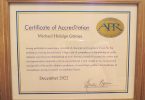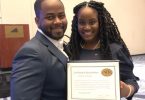When I first learned about Accreditation in Public Relations (APR), the requirements involved seemed like a mountain of work that I did not have the energy to attempt. Not only that, I didn’t see a connection between the APR and my military career.
After a few years of working with military public affairs, I was selected to spend a year as a fellow with the Army public affairs Training with Industry program (TWI). I really wanted to experience the full spectrum of civilian public relations experiences, so a few weeks into my TWI fellowship I applied for Accreditation in Public Relations + Military Communication (APR+M).
to spend a year as a fellow with the Army public affairs Training with Industry program (TWI). I really wanted to experience the full spectrum of civilian public relations experiences, so a few weeks into my TWI fellowship I applied for Accreditation in Public Relations + Military Communication (APR+M).
After receiving the green light from the Universal Accreditation Board, I enrolled in the APR online study course to help navigate the Mount-Everest-size workload and break it up into digestible sections. I also reached out online to the APR facilitators to request a mentor.
While I was excited about the opportunity to earn the credential, my anxiety grew each time I listened to or read about other APR candidates who failed to pass the computer-based Examination for Accreditation in Public Relations or to be Advanced through the Readiness Review.
After six months of immersing myself in APR learning material, I solidified my timeline to complete the Accreditation process by registering for a three-day APR Boot Camp. This allowed me to bundle up the Readiness Review and the Examination as well as unplug from the outside world and focus while in the company of other APR candidates, who were just as nervous and stressed as I was.
Miraculously, I successfully completed boot camp and made it the top of the APR+M mountain.
What helped me to get through the uphill challenge?
First, my APR+M mentor, who lived four states away, metaphorically held my hand and often prodded me through the process. I also was able to reach out to the APRs from NCPRSA and the APR online study course when I needed advice, encouragement and critique of my Readiness Review presentation materials.
Next, I disciplined myself to follow a study and work schedule that included sacrificing nights and weekends. I organized the extensive amount of learning material and created a calendar to get through the KSAs and the Readiness Review presentation step-by-step. I also created flashcards on Quizlet and invested in several of the recommended books for studying, especially Cutlip & Center’s “Effective Public Relations.”
Lastly, I fully invested in the APR online study course. I often downloaded the weekly webcasts to listen to while I was driving or exercising. I volunteered to present notes, case studies and questions during the online course cohort sessions, which helped me to connect the study information with its practical application.
Today, I am extremely grateful to those who helped me through the uphill journey. My confidence as a public affairs practitioner has increased and now I am connected to a group of professional communicators who are committed to learning and strengthening the public relations profession.
Jennifer Bocanegra, APR+M, is an Army public affairs officer with seven years of experience with military communication. She currently works at the Defense Information School at Fort Meade, Maryland. She recently completed a Master of Professional Studies in public relations and corporate communication with the Georgetown University School of Continuing Studies.







